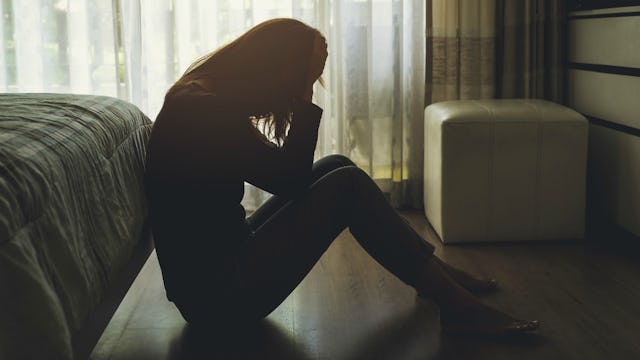Watching Your Parent Die Is Absolute Hell

My dad was dying long before we received the devastating news on a cold winter morning. After suffering a minor stroke, my father’s stage 4 cancer was discovered quite by accident while he had follow-up tests to prevent further strokes. As my father relayed the news to me, I gripped the phone and tried to comprehend what he was saying. His cancer was advanced, and suddenly, his time on Earth was finite.
His battle was over before it started.
At his advanced cancer stage, chemotherapy options were limited and surgery wasn’t an option. Radiation wasn’t going to thwart the progression, and when we looked at the hard evidence, it was clear that his quality of life was going to suffer a great deal if he put himself through the rigors of a chemotherapy regimen that had little to no chance of prolonging his life.
It was fucking hell to watch my strapping, larger-than-life father wither away into a frail cancer patient right before my eyes.
My dad was dying, and I was helpless to stop the inevitable.
A dying parent is excruciating. I would get physically ill as I listened to my father detail the side effects from chemotherapy, his exhaustion and nausea, and his daily litany of health issues from the cancer that was slowly eating away at his insides. I’d lay awake at night and wonder if tomorrow was the day his health would go from bad to worse. When your parent is dying, you die inside right alongside them.
A dying parent is exhausting. I forced myself to try to focus on the rigors of raising kids and running a household while trying to keep track of what doctors my father was seeing that day and remembering to call my mother for the rundown of the latest tests and blood work. I longed for the days when our lives didn’t center around the ups and downs of cancer, when I could selfishly call my dad just to tell him about a professional achievement or about his grandchildren. A dying parent means never knowing what the day will bring.
A dying parent makes you realize that you are selfish. You find yourself whispering, “Please let him make it to Easter” because you want your kids to get one more holiday with their beloved grandfather. You secretly will him to hold on because you’ve made travel plans and you are terrified he’ll pass away while you are out of the country. You find yourself irrationally angry because cancer will eventually steal your hero and you can’t bear the thought of your children not getting to have their grandfather around when they are adults. Having a dying parent means you have to forgive yourself for feeling selfish.
A dying parent means it’s next to impossible to do “normal” things like girls’ night out and date night without the urge to scream raging under your skin. My father was dying. How was I expected to sip cocktails and discuss The Bachelor like nothing was wrong? How was I supposed to go on living when his life was being cut short prematurely? Having a dying parent means you have to push through the guilt of feeling joy and happiness because you know that your parent expects nothing less.
A dying parent means there’s no rule book. There’s no play-by-play list that you can refer to on the days when the panic and rage are so raw that you think you might actually lose your mind. And while your friends do their best to sympathize with you, no one understands the sheer desperation that always threatens to bubble over in the middle of the cereal aisle at the grocery store. A dying parent means that you will be pushed to your limits, and you will find strength you didn’t know you possessed.
A dying parent means facing your own mortality with new eyes. In the final months of my father’s illness, I’d often look at my children and worry that my death would burden them in the same way. I worried that the fear and terror I felt in those months would be their journey someday when their father and I will face our own health issues. I wondered if I could be strong for them, like my father was for me, and I prayed that I could face death with the grace my father showed near the end. A dying parent means realizing that you, too, will someday be the dying parent.
A dying parent means your friends will say the wrong things and you will forgive them because they mean well. You will smile and nod when people offer platitudes, and you will gratefully accept frozen lasagnas that you will eat for a month because you are sure you’ll never cook again.
A dying parent means you will find yourself looking at your father’s hands and trying to memorize how they look when he’s reading to his grandchildren. It means breathing in his scent and praying that you’ll always remember that your head fit perfectly under his chin when he enveloped you in a bear hug. A dying parent means realizing that the earthly body you’ve loved fiercely will soon be one with the earth.
A dying parent will teach you that there’s nothing a parent won’t do to make it easier for their child in the end. You will hear your dying parent say, “I’m ready,” and even though you aren’t, you’ll let go of the hand that you’ve held since you were small.
When your parent finally finds peace, you realize that your parent is still teaching you about life.
Only now, you are learning about life without your dying parent.
And it’s a new kind of hell.
This article was originally published on